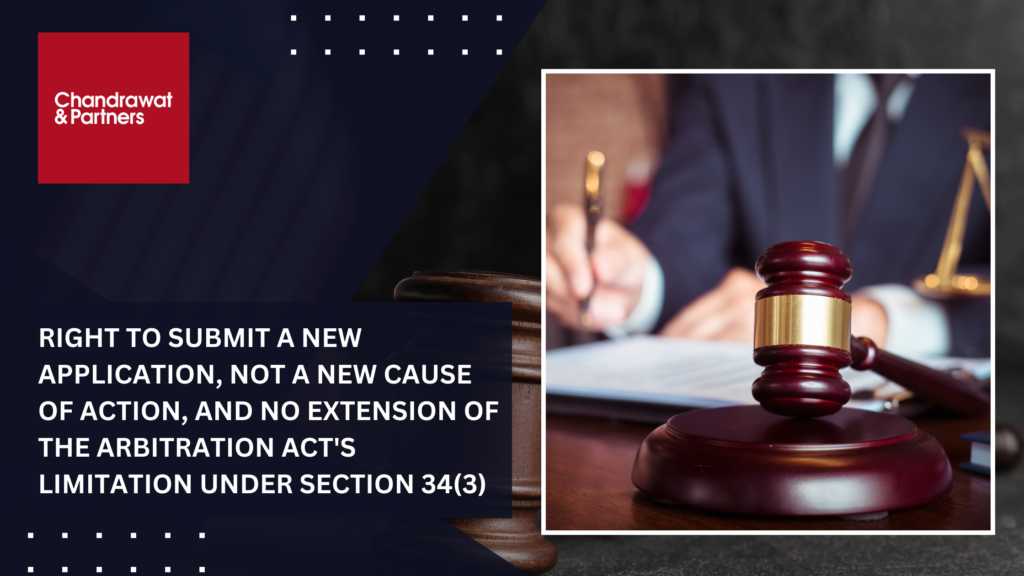Home > Recent Judgements > Right To Submit A New Application, Not A New Cause Of Action, And No Extension Of The Arbitration Act’s Limitation Under Section 34(3)
Nov 26, 2024

BACKGROUND
In the case between National Health Authority vs M S Intermarc, the case revolves around a contractual dispute where the appellant had issued a tender for the renovation of its office, awarding the contract to the respondent for Rs. 3,14,95,840/- with an 80-day completion deadline, subject to liquidated damages of Rs. 5,00,000/- per day for delays. The respondent delayed the work by 6½ days, incurring Rs. 32,50,000/- in liquidated damages, prompting the respondent to invoke arbitration. The findings of the arbitral tribunal were in favour of the respondent. This made the appellant make an application under Section 34 of the Arbitration Conciliation Act 1996 against the arbitral award. However, this application was made within the wrong forum and later made in the Trial Court with more than the required statutory period of 120 days including 30 days which are condonable under Section 34(3) of Arbitration and Conciliation act. The application was declined by the Trial Court as being time barred, and the appeal of the appellant under Section 37 too met with failure as the Delhi High Court pointed out that the timelines given in the statute at Section 34(3) are very precise and cannot be varied even using the provision of Section 14 of Limitation Act.
ISSUES
- Whether the liberty to file a fresh application before the competent court amounts to a fresh cause of action for the appellant?
- Whether the appellant’s fresh application under Section 34 of the Arbitration and Conciliation Act was barred by limitation despite availing the benefit of Section 14 of the Limitation Act?
- Whether the statutorily prescribed limitation period under Section 34(3) of the Arbitration and Conciliation Act, including the condonable delay of 30 days, can be extended under any circumstances?
- Whether the appellant’s plea for condoning the delay of 14 days on account of being a government body requiring administrative approvals was tenable under the law?
JUDGEMENT
The appeal of the appellant was rejected by the Delhi High Court on the grounds that the application filed under section 34 of the Arbitration and Conciliation Act,1996 is time barred having been filed on the 134th day of the 120-day period provided the including the 30-day condonable delay. The court also explained that seeking our sanction to make a new application before the competent court does not constitute a fresh cause of action as the relevant dates of the arbitral award remained the same. Even while the benefit of Section 14 of the Limitation Act was applicable in respect of the period during which this wrongful application was made, the respondents could not be condoned for more than 14 days delay. The court further held that since the appellant is a government body there were not any further grounds for granting additional consideration based on administrative delays, reiterating that the time limits set in section 34(3) are strict. In the end, the appeal was upheld as completely lacking in merit.
OBSERVATION
In response, the Delhi High Court noted that the acquisition of properties for the project has not added a separate cause of action to obtain any other relief and the date of the arbitration award does not change. The appellant’s plea under Section 34 of the Arbitration Act was also out of time as such period is of 120 days as prescribed by law, with 30 days being the ‘delay’ which could be extended under section 34(3) of the Act. The Court noted that bureaucratic processes, even when they relate to the requisite procedural steps taken by a government department, cannot be advanced to permit breaching of this statutory timeframe. It follows therefore that the lack of merit in seeking the appeal led to its dismissal. The application by the appellant was also deemed to be out of time.
For more information or queries, please email us at
enquiries@chandrawatpartners.com




